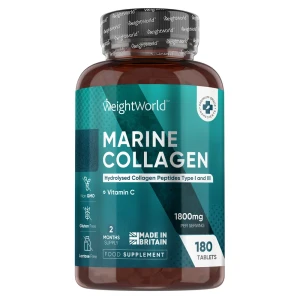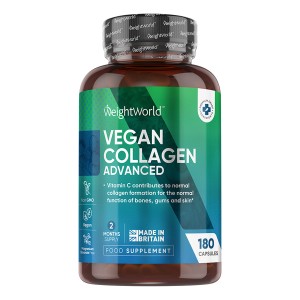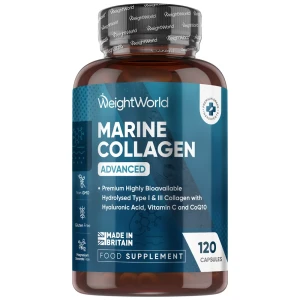One of the hidden supplementary secrets of the beauty world, is the anti-ageing properties of hydrolysed collagen supplements for the purpose of supporting your skin's elasticity and youthful appearance on the outside, whilst reinforcing the strength of your joints & muscles on the inside. Collagen is so versatile in its uses that it's even used for the maintenance of healthy hair too. But what is collagen, why do you need to add this superfood into your diet and where is the best place to get it? We at WeightWorld have established ourselves’, thanks to a history in healthcare that stretches all the way back to 2005, as one of the UK experts in food supplements, including collagen supplements of course! So here we'll give you a handy guide to the world of collagen.
What Is Collagen?

If you want to find collagen fibres, your best bet is to look in the bodies of most living things. Collagen in a scientific sense, is a substance that keeps muscles, bones, joints, hair etc. together! Collagen production occurs in connective tissue (skin, joints, tendons etc) where the resulting material works to strengthen and increase the elasticity of the area around it. Ever wondered how your blood vessels can pump blood around your body without becoming loose and the pressure decreasing? Collagen is largely the reason why.
In fact, this is why collagen supplements are so popular for anti ageing in the first place. As your body grows older, tissues lose their elasticity and this explains the appearance of wrinkles in skin as well as the loss of radiance in hair and the wearing of nails. A hearty dose of collagen can be just what the body needs to slow and even in some cases, reverse this phenomenon of life.
What Types Of Collagen Are There?
- Bovine Collagen
- Marine Collagen
- Bone Broth Collagen (Poultry - Chicken etc.)
Since collagen can be found in the connective tissue of many living things, it's unsurprising that there are multiple different forms of it. The most common sources of collagen for cosmetic purposes are bovine & marine sources. Both of which provide you with the anti ageing benefits that can benefit your hair, skin & nails simultaneously. The two do have some differences though. Bovine collagen is also incredibly high in protein and is enriched with essential amino acids, making it the hydrolysed collagen of choice for those wanting to target their muscles too. Marine collagen is often considered the more idealised natural skin care solution as it can be very highly concentrated. Furthermore, marine collagen supplements are also halal-friendly & arguably a more ecologically friendly collagen source for supporting your overall wellbeing.
Beyond just the animal sources of collagen supplements, there are also different internal forms of collagen within those! Once collagen is inside the body, it can be sorted into 3 unique categories, type 1, type 2 & type 3…and yes, they all fulfil a different purpose.
- Type 1 and 3 are relatively similar and are the kind that you will find in marine and bovine collagen. They are what the body uses in connective tissue like muscles, hair & skin, which is where the idea of collagen supplements being good for anti-ageing comes from. These two forms are ideal for use supporting the muscles and the skin in order to keep muscles from tearing and keeping skin looking smooth and supple. However that is not to say that they cannot also be used in joints, as they can also be used in the reinforcing of bone to maintain healthy joints.
- Type 2 collagen is considered more geared towards the task of joint lubrication. It's often used in the production of joint cartilage in order to aid the frictionless movement of bones. Which collagen you take is up to you, but sources such as marine and bovine collagen contain both type 1 and 3, allowing you to effectively cover more ground with the benefits.
How Is Collagen Taken
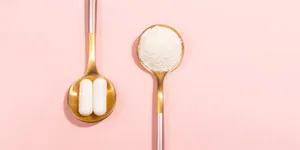
Collagen supplements can come in many forms from capsules to powder and even a liquid. Capsules are often considered to be the most easy and effective way to take collagen because all you need is water, but for those who don’t like capsules, stirring a flavourless collagen powder into drinks or your meals can be a great way to get your fix without necessarily even having to recall when to take it. Drinks are less common but still an effective way of getting the product into your body immediately.
- Capsules
- Pills
- Liquid
- Powder
- Shot
What Are The Benefits Of Collagen?
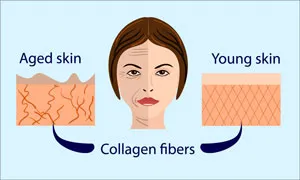
For Skin
collagen can be used as a great way to slow and fight back against the appearance of ageing as it boosts glowing skin and works to keep skin looking firm and supple. Many people take collagen in their older years to fight off free radicals and manage to maintain a youthful appearance for longer as a direct result.
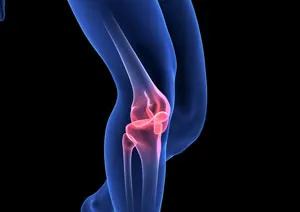
For Joints
Another inward sign of ageing is problems with joints. As you get older, or even when you are younger for that matter, worn joints can make movement difficult and restrict your mobility. Collagen is an ally in the battle with this problem as it's often taken as a means of reinforcing joints to help either prevent these issues, or restore the structural integrity of already worn joints.
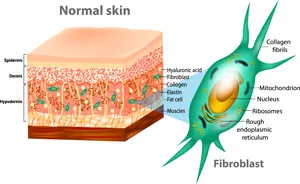
For MusclesAs a connective tissue component, collagen is also ideal for supporting your muscles and tendons. This can help prevent wear and tear from over straining and the high protein content (as high as 90% in some cases) is great for also helping build and tone muscle mass.
What Risks Are There When Taking Collagen
Due to Collagen supplements being a natural way to supplement your body on a daily basis - there are no huge risks to taking them. However, many Collagen’s are treated using harsh chemicals when it goes through the process of being made fit for consumption which means that there is a risk of consuming unwanted additives, preservatives and chemicals when you take it. One way of avoiding this problem is to actively seek out pure forms of collagen in your collagen supplements.




